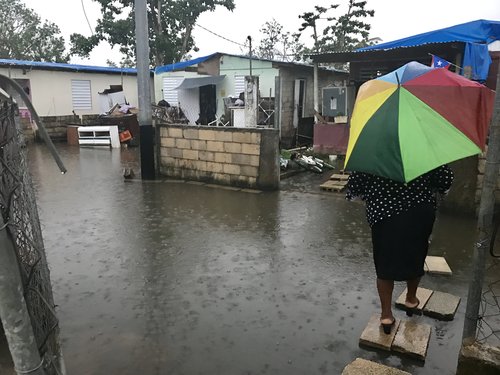Meeting the Urgent Needs of Hurricane Maria Survivors in Puerto Rico

In late September 2017, Hurricane Maria, one of the strongest Atlantic hurricanes on record, directly struck the Commonwealth of Puerto Rico, a territory of the United States. The hurricane resulted in catastrophic damage to critical infrastructure and left the island’s entire population of 3.4 million people literally and figuratively in the dark, and in urgent need of life-saving humanitarian assistance.
Maria survivors are encountering enormous challenges navigating the U.S. Federal Emergency Management Agency’s (FEMA) bureaucratic and opaque assistance process and lack sufficient information on whether, when, and how they will be assisted.
In late November, Refugees International (RI) conducted a mission to Puerto Rico to assess the protection and assistance needs of the most vulnerable hurricane survivors. This was RI’s first mission within the United States in the organization’s 38-year history. Our goal was to provide insights and expertise based on RI’s long history of advocating for improvements in responses to international humanitarian crises and our experience in similar acute, sudden-onset, weather-related disasters in foreign countries, including island nations.

At the time of RI’s mission to Puerto Rico, more than two months after the storm hit, our team encountered a response by federal and Puerto Rican authorities that was still largely uncoordinated and poorly implemented and that was prolonging the humanitarian emergency on the ground. While food and bottled water are now widely available and hospitals and clinics back up and running, thousands of people still lack sustainable access to potable water and electricity and dry, safe places to sleep. Moreover, Maria survivors are encountering enormous challenges navigating the U.S. Federal Emergency Management Agency’s (FEMA) bureaucratic and opaque assistance process and lack sufficient information on whether, when, and how they will be assisted.
International best practices endorsed by USAID and other international humanitarian agencies should be brought to bear both in Puerto Rico and in future U.S. disasters.
Grappling with questions around Puerto Rico’s medium- to longer-term recovery requires Congress’s and the Trump Administration’s focus and attention – but it will take time. In the meantime, we cannot leave our fellow Americans in Puerto Rico without adequate assistance and support.
The horrendous conditions that tens of thousands of Puerto Ricans – many of whom are poor and elderly – continue to endure require the Trump Administration and Congress to prioritize needs and corresponding response programs. FEMA and Puerto Rican authorities, with support from the highest levels of the U.S. federal government, must immediately adopt a more streamlined, coordinated, transparent, and effective strategy that includes, among other things, ensuring that survivors have access to safe and secure accommodations while longer-term recovery programs get up and running. In doing so, international best practices endorsed by the U.S. Agency for International Development’s Office of Foreign Disaster Assistance (USAID/OFDA) and other international humanitarian agencies should be brought to bear both in Puerto Rico and in future U.S. disasters. In addition, affected populations must be provided with better and easier-to-comprehend information on FEMA’s assistance process.